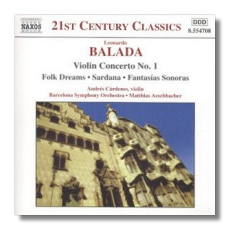
The Internet's Premier Classical Music Source
Related Links
- Latest Reviews
- More Reviews
-
By Composer
-
Collections
DVD & Blu-ray
Books
Concert Reviews
Articles/Interviews
Software
Audio
Search Amazon
Recommended Links
Site News
 CD Review
CD Review
Leonardo Balada

- Violin Concerto #1 (1982)
- Folk Dreams (1994-98)
- Sardana (1979)
- Fantasias Sonoras (1987)
Andrés Cárdenes, violin
Barcelona Symphony Orchestra/Matthias Aeschbacher
Naxos 8.554708 75:18
Leonardo Balada was born in Barcelona in 1933. A student of Persichetti and Copland, he has taught composition at Carnegie Mellon University in Pittsburgh since 1970. Stylistically, his music is a bit difficult to pin down, but it has neo-Classical features, ethnic elements (both from his native Spain and elsewhere in Europe), a healthy dose of humor, and the tendency to turn from atonality to tonality on a dime. Don't be misled, though – his music, at least as presented on this CD, is mostly tonal and quite approachable stuff. But it's a little tricky, too.
The Violin Concerto starts off, for instance, with dissonant sustained chords auguring a foray into some atonal world of austerity and gray shadings. But gradually the dense layers lift and the insistent opening chords of the violin help to usher in a brightly-lit world full of playful shrieks and other colorful effects, both from the orchestra and the soloist. Balada is certainly a master orchestrator, and a composer with a strong lyrical side. The thematic material derives from Catalan folk melody and as the movement progresses its character emerges more strongly.
The second movement presents a lovely melody at the outset, which then becomes obscured as the movement proceeds. The finale seems to have more thematic complexity than the first two movements, presenting a theme that grows more elaborate and brilliant as the music progresses. In the end, this is a work of substance that ought to have more exposure. I doubt it will receive any beyond this, since we are in an age of discovery and rediscovery, where good music often gets obscured by the dross and mediocrity that someone digs up and declares the latest rediscovered masterpiece.
The three movements comprising Folk Dreams each use folk themes from a different land: Line and Thunder, the first piece, uses one from Latvia; Shadows, the second, employs one from Catalonia; and the last, Echoes, uses several from Ireland, and its music will sound the most familiar of all to most listeners. This is a solid composition, whose individual movements were composed at different times (1996, 1994, and 1998, respectively), probably originally intended to be separate pieces. I would say that Echoes, if played apart from the others, has a chance of entering the standard repertory. It is colorful and well crafted, full of humor and nostalgia, and its familiar Irish melodies are imaginatively handled by Balada.
The other two works here are also of high quality, and I'm tempted to write that they are not quite on the level as their disc mates, because they have more immediate appeal, and – you know the story – won't quite wear as well. But I'm not sure that's the case. Sardana and Fantasias Sonoras are the most approachable works on the disc, to be sure. The first of this pair contains much rhythmic appeal (Sardana is the national dance of Catalonia) and has at times a Stravinskyan sound, especially in its deft writing for the reeds. Its music becomes infectious as you listen. It's light and colorful, not deep stuff, but so well crafted, so brilliantly orchestrated, that you're apt to play it again and again. In the latter work, which translates to Fantasies in Sound, one finds much the same qualities, though it's hardly a carbon copy. It, too, is an absolute delight.
Overall, this is a fine disc of music by a composer who ought to be better known. The sound is excellent and the performances are fine. Violinist Cárdenes turns in splendid work in the concerto and Aeschbacher and the Barcelona players deliver incisive readings. The notes by the composer are obviously enlightening. Highly recommended.
Copyright © 2001, Robert Cummings


















